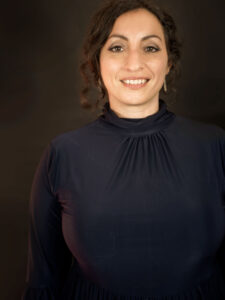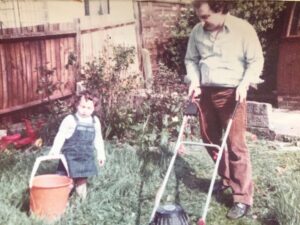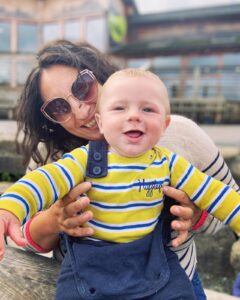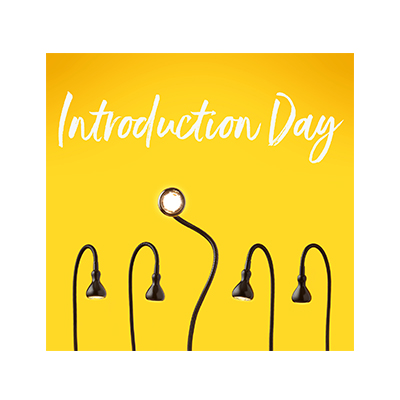 I’m a child of the globe. My Russian father and my Persian Jewish mother met and married in Israel before moving to London, where I and my younger brother were born.
I’m a child of the globe. My Russian father and my Persian Jewish mother met and married in Israel before moving to London, where I and my younger brother were born.
Their marriage was an unhappy union of polar opposites and my experience of their very different approach to parenting created an inner conflict that I’ve been trying to resolve ever since.
For the first ten years of my life I was surrounded by arguments and anxiety until my parents finally got divorced and my childhood environment changed significantly. Though it was certainly better to live without the conflict, my brother and I were often left to our own devices, as our father became a Saturday fixture and our mother struggled to make a living in the nineties recession.
Neither of our parents discussed or asked about our feelings. I learned to avoid my difficult emotions by developing compulsive behaviour patterns. On the outside I was the dutiful golden child who worked hard and excelled but I either neglected my own needs or met them in self-destructive ways – with food and unhealthy relationships.
I started on the therapy trail quite early with counselling at sixteen and throughout my university years. When I graduated in the early 2000’s, I enrolled in the Insight seminar series in London which opened my eyes to a different approach to life and gave me a map of how to reach personal fulfilment.
Work wise this set me on the path to my own business, facilitating global education programmes for professionals. I devised a method called The Career Equation®, to enable adults worldwide to find their ideal work and create their best lives.
In my personal life I fell in love and married a wonderful man. The only challenge we faced was our desire to start a family, which proved to be the start of a long battle with infertility.
I’d known about Hoffman for twelve years but I’d always felt a week was a long time to be looking at my childhood conditioning – I wasn’t sure I had enough material! That all changed when I discovered I was finally pregnant. It suddenly became a priority not to pass on my parental patterns to my child. My unborn child became my motivation and also gave me a time frame, as you can only do the Process before the third trimester of pregnancy. I knew that, once he was born, I wouldn’t have felt comfortable leaving him for so long.
 I’d been told the course was going to be both intensive and cathartic, so I talked to my unborn baby and explained that I was doing it so I could be a better mother. I told him there may be tears and shouting, but that he shouldn’t be afraid, he was safe within me and the results would be worth it for us all.
I’d been told the course was going to be both intensive and cathartic, so I talked to my unborn baby and explained that I was doing it so I could be a better mother. I told him there may be tears and shouting, but that he shouldn’t be afraid, he was safe within me and the results would be worth it for us all.
The course facilitators were very thoughtful and mindful of my situation so I was able to rest between exercises, as the days were long and challenging. I was particularly careful doing the cathartic release. Afterwards some of my group said when they were tempted to stop, the sight of this whopping, unwieldy pregnant lady going hell for leather inspired them to keep going and make the very most of the Process!
I live by the rule that if you bring 99% of yourself to any experience it’s a struggle but giving it 100% will make it a breeze. So I knew I had to surrender all resistance and jump into it fully.
My professional coaching head was often critiquing the Process exercises and techniques but what I enjoyed most – and what surprised me most – was the level of forgiveness I found. Things I’d thought were irretrievably stuck were rinsed off. Over and over again, the rituals and exercises brought greater clarity, hope and a greater sense of freedom. I was also very moved by my peers on the course – their honesty, resilience and experience helped me a lot.
I’ve certainly changed since the Process and I’m so glad I did it before Barney was born. Hoffman gave me the tools to be more fully myself and I feel I now have a greater range of engagement, which is important as a mum.
I like myself more and I’m able to be more respectful of others and can contain my frustration and temper better. I still have patterns of being over-enthusiastic and over-committing but I’m more aware of it and able to find a balance. I think I’m more compassionate and able to see the humanity in others. I’m also more emotionally honest and outspoken in my vulnerability, so for example, I’ll now tell my parents in a neutral way if I’m upset by something they’ve said or done, which I wouldn’t have done before and that enables more honesty and intimacy.
 Evidence of how far I’ve come is that I decided to invite my mother to stay with us for the whole of the pandemic lockdown. Despite challenges in our relationship and finding her behaviour really frustrating at times, I was able to stay fairly calm and allow her to find her place in our family life, as I knew her safety was so important. As a result she spent three months with us, developing a very sweet relationship with our son. This would never have happened had it not been for Hoffman.
Evidence of how far I’ve come is that I decided to invite my mother to stay with us for the whole of the pandemic lockdown. Despite challenges in our relationship and finding her behaviour really frustrating at times, I was able to stay fairly calm and allow her to find her place in our family life, as I knew her safety was so important. As a result she spent three months with us, developing a very sweet relationship with our son. This would never have happened had it not been for Hoffman.
By the end of the Process I felt happy, humble and grateful and that remains with me still, as do the lovely friends I made on the course. By the end, I was flooded with gratitude for all that my parents had given me and the sacrifices they made. They struggled to give me a great education, taught me how to think like an entrepreneur and to understand the value of self-discipline. They encouraged me to stay open-minded to others and fed a real curiosity about life, culture, people, art and society. They inspired in me a love of travel and adventure as well as teaching me practical things, like the ability to put an outfit together, or the importance of always reading documents before you sign them!
I wrote to both my parents afterwards to share what I’d learned. My father was very moved. My mum hardly mentioned it. Both responses are just fine with me.
I know I’m not the perfect mother. My son will also have a list of moments when I wasn’t there for him in the way he wanted but I know now he’ll also have a long list of gifts that he received from me and my husband. At the centre of these will be my commitment to be curious, have faith in yourself and in life and to have the ability to learn and grow from each experience. I hope I’ll pass this onto him, along with the importance of love, kindness, patience and the ability to listen to people, nature and the world around us and respond thoughtfully.
Before the Process I’d been estranged from my brother for 8 months but after the course I wrote him a very honest letter and we’re now back in contact.
Work-wise I’m very lucky to be doing something I love. As a career coach and expert on the future of work I’m often helping people at a transitional point in their career.
It’s in childhood that our talents can either be noticed and supported or misunderstood and neglected. This can have a massive impact on the work we choose. I believe that when we’re reunited with our core self and our gifts, our work can transform both ourselves and others in a very positive way. So examining our childhood can be really helpful in showing us the changes we need to make in order to truly thrive and shine at work.
Erica’s Four Factors To Thrive at Work
In the current climate, I feel it’s even more important to find rewarding work. I always say there are four factors to consider for a thriving career. This is what I call The Career Equation®
- Play to your strengths and use your gifts – we do best when we work in an area of natural ability. This could be anything from talking to strangers to working with our hands.
- Apply your strengths to something you care about – applying our skills to a subject matter, issue or industry that inspires us makes a perfect match.
- Know how you define success. The results of the work you choose should be meaningful and matter to you.
- Choose a work environment that enhances your qualities and capabilities. We’re like plants and we need the right soil to thrive in.
To join a free career planning class and find out how Erica’s Career Equation® model is helping professionals create their best working life, visit: www.ericasosna.com






 Sign up to receive monthly newsletters from Hoffman
Sign up to receive monthly newsletters from Hoffman